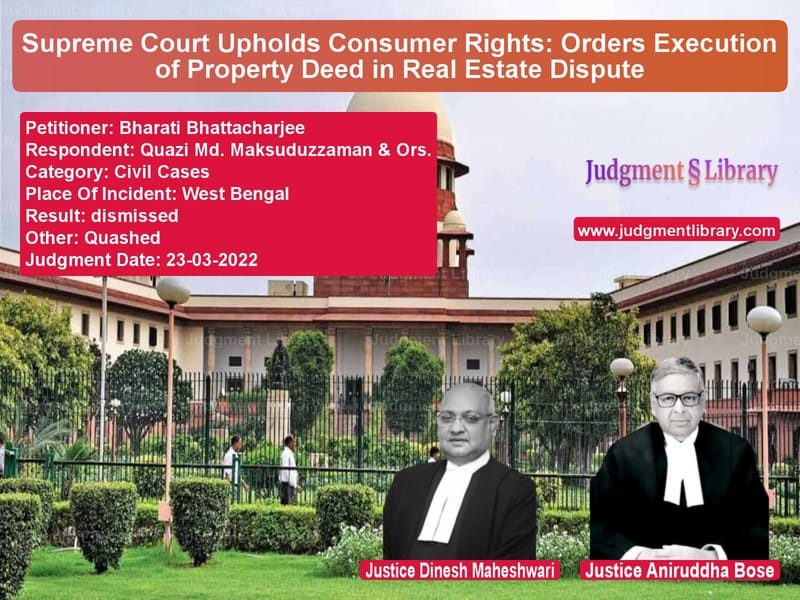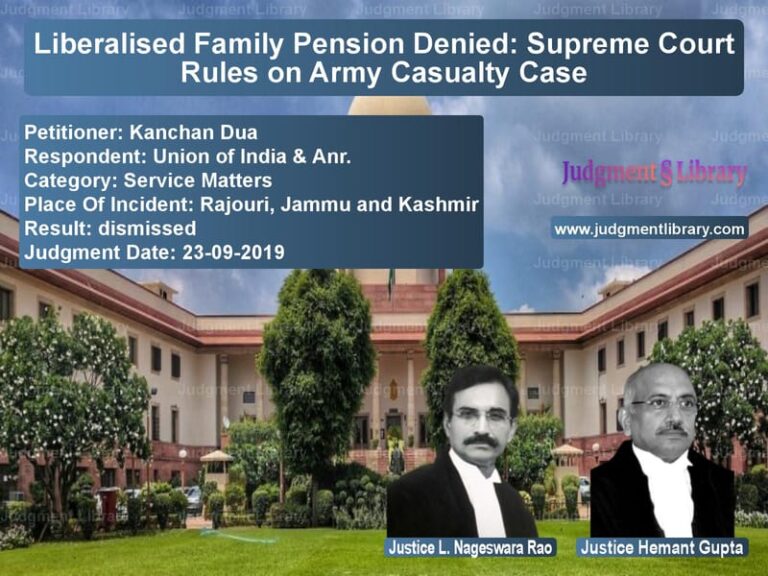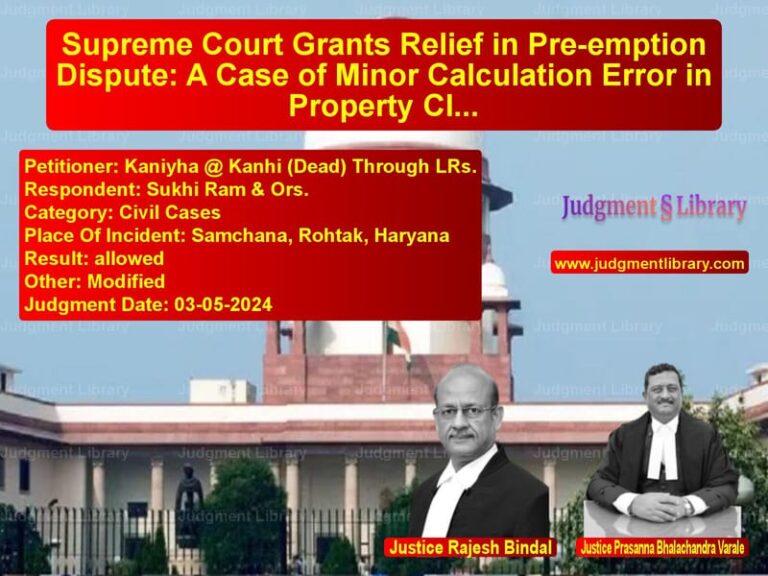Supreme Court Upholds Consumer Rights: Orders Execution of Property Deed in Real Estate Dispute
The Supreme Court of India, in the case of Bharati Bhattacharjee v. Quazi Md. Maksuduzzaman & Ors., ruled in favor of homebuyers by upholding the order of the National Consumer Disputes Redressal Commission (NCDRC). The decision quashed the attempts of the builder to evade the execution of the sale deed, reinforcing the rights of consumers in real estate transactions. This case serves as a landmark ruling on protecting consumer rights in property disputes.
The appellant, Bharati Bhattacharjee, challenged the judgment of the National Commission, which had directed her to execute and register the sale deed in favor of the complainants. The dispute centered around agreements for sale where substantial payments were made, but the property deed was not executed. The Supreme Court dismissed the appeals and upheld the order, ensuring justice for the homebuyers.
Background of the Case
The dispute arose when complainants, the respondents in this case, approached the District Consumer Disputes Redressal Forum, South 24-Parganas, alleging that the appellant had failed to execute and register the Deed of Conveyance despite receiving a significant portion of the sale consideration.
In Complaint Case No. 111 of 2013:
- The agreed sale price was Rs. 9,00,000.
- The complainants had paid Rs. 5,79,000.
In Complaint Case No. 112 of 2013:
- The agreed sale price was Rs. 7,00,000.
- The complainants had paid Rs. 4,92,000.
The appellant contended that there were multiple agreements, effectively increasing the sale price, which the complainants disputed. The District Forum ruled in favor of the complainants, directing the execution of the sale deed.
Petitioner’s Arguments
The appellant, Bharati Bhattacharjee, presented the following arguments:
- The complaints were time-barred under Section 24A of the Consumer Protection Act, 1986, as they were filed more than two years after the cause of action arose.
- There were multiple agreements for sale, and the complainants had misrepresented the true sale price.
- The complainants failed to prove their readiness and willingness to complete the transaction, a requirement under the Specific Relief Act, 1963.
- The lower consumer fora had ignored evidence, particularly the agreements showing different sale amounts.
Respondent’s Arguments
The respondents, the homebuyers, countered these arguments by stating:
- The cause of action arose when the appellant refused to execute the sale deed, not at the time of the agreement.
- The claims regarding multiple agreements were baseless and rejected by the National Commission.
- They had consistently pursued the matter and sent legal notices, showing their intent to complete the transaction.
- The appellant was attempting to defraud them by inflating the sale price and delaying registration.
Supreme Court’s Observations
The Supreme Court thoroughly examined the evidence and found:
“The UGC Regulations, 2018, which prescribe the qualifications and appointment process for Vice Chancellors, are binding on all state universities receiving financial assistance from the Central Government. Any appointment made in violation of these regulations is ultra vires.”
Read also: https://judgmentlibrary.com/supreme-court-upholds-specific-performance-in-land-sale-dispute/
The Court dismissed the appellant’s claims, stating:
- The complaints were within the limitation period since the refusal to execute the sale deed constituted the cause of action.
- There was no evidence to support the existence of multiple agreements.
- The appellant’s conduct indicated a deliberate attempt to avoid executing the sale deed despite receiving substantial payments.
Supreme Court’s Verdict
Based on these findings, the Supreme Court:
- Dismissed the appeals and upheld the National Commission’s ruling.
- Ordered the execution of the Deed of Conveyance as per the original agreements.
- Directed the appellant to accept the remaining balance along with 10% interest per annum.
- Imposed costs of Rs. 50,000 on the appellant for unnecessary litigation and delay.
Legal Implications of the Judgment
The ruling has significant implications for real estate disputes and consumer protection:
- Reinforcement of Consumer Rights: The decision strengthens consumer rights against unscrupulous builders and sellers.
- Timely Execution of Property Deeds: Builders cannot delay or refuse execution of sale deeds after receiving payments.
- Protection Against Misrepresentation: False claims regarding multiple agreements will not be entertained without solid proof.
- Encouragement for Timely Legal Action: Consumers must remain vigilant and take legal steps within the limitation period.
Conclusion
The Supreme Court’s decision in Bharati Bhattacharjee v. Quazi Md. Maksuduzzaman & Ors. is a landmark ruling in consumer protection and real estate disputes. It upholds the principle that once a sale agreement is signed and payments are made, the seller is legally bound to execute the sale deed. The judgment sends a strong message that consumer rights must be protected, and builders or property sellers cannot use unfair practices to defraud homebuyers.
This ruling will serve as an essential precedent for future cases involving delays in property registration, setting a clear standard for real estate transactions.
Petitioner Name: Bharati Bhattacharjee.Respondent Name: Quazi Md. Maksuduzzaman & Ors..Judgment By: Justice Dinesh Maheshwari, Justice Aniruddha Bose.Place Of Incident: West Bengal.Judgment Date: 23-03-2022.
Don’t miss out on the full details! Download the complete judgment in PDF format below and gain valuable insights instantly!
Download Judgment: bharati-bhattacharje-vs-quazi-md.-maksuduzza-supreme-court-of-india-judgment-dated-23-03-2022.pdf
Directly Download Judgment: Directly download this Judgment
See all petitions in Consumer Rights
See all petitions in Property Disputes
See all petitions in Specific Performance
See all petitions in Damages and Compensation
See all petitions in Judgment by Dinesh Maheshwari
See all petitions in Judgment by Aniruddha Bose
See all petitions in dismissed
See all petitions in Quashed
See all petitions in supreme court of India judgments March 2022
See all petitions in 2022 judgments
See all posts in Civil Cases Category
See all allowed petitions in Civil Cases Category
See all Dismissed petitions in Civil Cases Category
See all partially allowed petitions in Civil Cases Category







